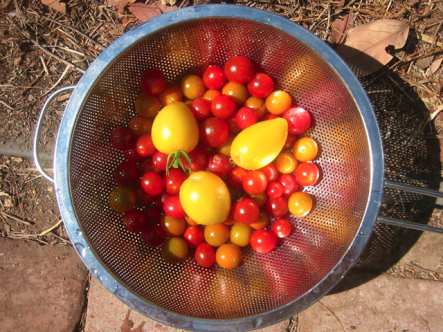Prompted over the past few years by oil wars, global warming, ecological collapse, natural disasters and our psychotic federal government, we’ve made a few changes in the way we live.
Now the day begins when Erik gets up to let the chickens out of their henhouse. It’s a structure so thoroughly secured against marauding raccoons that we’ve named it "Chicken Guantanamo." The hens have been patiently waiting for that door to swing open since first light. Next, while the coffee brews, Erik throws some flour and a cup of sourdough starter into the mixer. He bakes a loaf of artisanal sourdough bread for us every other day, and we rarely meet with any bread that tastes better.
I get up a little later than Erik and stagger into the garden first thing. I say hi to the hens, add some kitchen scraps to the compost pile, and turn on the drip irrigation systems that water our vegetable beds. As of this writing our garden is bearing tomatoes, cucumbers, fava beans, Swiss chard, figs, ground cherries, leeks, eggplants, assorted herbs and a selection of cultivated weeds. I'm looking forward to the corn, avocado and pomegranate harvest, all of which are a few months away.
For breakfast I enjoy homemade yogurt with raw honey or maybe a thick slice of the aforementioned sourdough, toasted and smeared with tangy homemade apricot butter. After breakfast I take three sheets of tomatoes down to the solar dehydrator so we'll have sun dried tomatoes in the winter. Then I hang a load of laundry out on the line.
Where do Erik and I live? In the heart of urban Los Angeles, in a decaying bungalow on a small plot of land. We are urban homesteaders.
What is an Urban Homesteader?
An urban homesteader is someone who enjoys living in the city, but doesn't see why that should stop her from engaging directly with nature, growing her own food, and striving for self-sufficiency.
We don’t wish to retreat to the countryside and live like the Unabomber in a plywood shack. We believe that people are best off living in cities and cooperating with other like-minded folks. Instead of hoarding ammo and MREs, we're building the skills and forming the conditions and networks that sustain us, our friends and our neighbors, now and into the future.
Urban homesteading is about preparedness, but we don't like that term very much. It connotes stockpiling things that you hope will keep your ass alive. Survivalism in general is about the fear of death. Urban homesteading is about life – it is a way of life founded on pleasure, not fear. Our preparedness comes not so much through what we have, but what we know. We are recollecting the almost-lost knowledge of our great-grandparents, those most essential of human skill sets: how to tend to plants, how to tend to animals, and how to tend ourselves.
Over the last couple of generations we've given up these skills in exchange for a self-destructive addiction to "convenience," becoming, as a friend of ours likes to say, the only animal that cannot feed itself. We do not make anything anymore, we just consume – we are '"consumers," defined solely by our appetites, and empowered only in how we spend a dollar.
We figured it was time to become producers again.
That is what we are trying to do here on our little urban farm: produce food, hack our house to generate power and recycle water, plot revolution and build community. Changing what and how we eat is at the heart of everything, though. Homegrown food is mind-blowingly fresh and flavorful, 100% organic, untainted by disease, blood or oil, and alive. Trust us, once you discover that lettuce actually has a distinct flavor, or you eat a sweet tomato still warm from the sun, or an orange-yolked egg from your own hen, you will never be satisfied with the pre-packaged and the factory-farmed again. The next step after growing fresh food is using the old home arts to preserve it: pickling, fermenting, drying and brewing.
Over and over again we've discovered that anything we figure out how to do ourselves tastes better than what the market offers us. If it wasn't, we probably wouldn't keep doing this. Yes, it is a "green" way to live, it is a prepared way to live, it has many virtues, but frankly, it is pleasure that inspires us to do more and more. Get into this a little, and you'll realize that all of your life you've been cheated. Urban homesteading is not about deprivation or suffering, it is about reclaiming your heritage, and your right to real food and real experience.
Make The Shift
We are not alone, and we didn't invent this idea. Urban homesteading is a movement, a quiet movement of sensible people making the smart choice of disconnecting ourselves in healthy ways from an increasingly untenable reality and creating our own culture from the ground up. We live better, we eat better, we're saving the planet. What's not to love?
Anyone can be an urban homesteader, even if you live in an apartment. You can grow more food than you think in a small space: on a balcony, a roof, a side yard. Do you live in a windowless hole? Then use a community garden plot, or claim land and become a pirate gardener. Opportunity abounds even for those of us in the dense metropolitan core. We’ve met a guy who keeps bees on his roof and harvests hundreds of pounds of honey each year in the middle of Brooklyn.
Most American cities sprawl. They possess tremendous amounts of wasted space. Once you take the red pill and open your eyes, all of that space begs to be cultivated. It is an offense on the level of sin for good land to sit unappreciated and unused under lawn and concrete. The single family dwelling with its defensive swath of front lawn and hidden backyard – the basic unit of the American dream – happens to be the perfect mini-farm. We have a vision of cities greened not by lawns, but by crops, thousands of city gardens collectively forming vast tracts of urban acreage. We each can start with our own patch of land and in so doing inspire others. Since we planted our parkway (that useless space between the sidewalk and the street that is technically city property) with vegetables, several of our neighbors have planted their own victory gardens.
Urban homesteaders are forming organic networks to share knowledge and know-how. What our ancestors took for granted, we have to reinvent. It is hard to figure all this out alone, so we have to help each other. Erik and I have been documenting our homesteading experiences on our own blog, Homegrown Revolution, for over a year. Now we are going to be the in-house urban homesteaders at Reality Sandwich. Over the coming weeks our posts here will cover the homesteading basics. Not by ranting, as we have today, but through step by step projects and practical advice that will make a homesteader out of you in no time. See you soon.
Homegrown Revolution's Kelly and Erik are the authors of the upcoming handbook The Urban Homestead, available in spring 2008 through Process Media.















